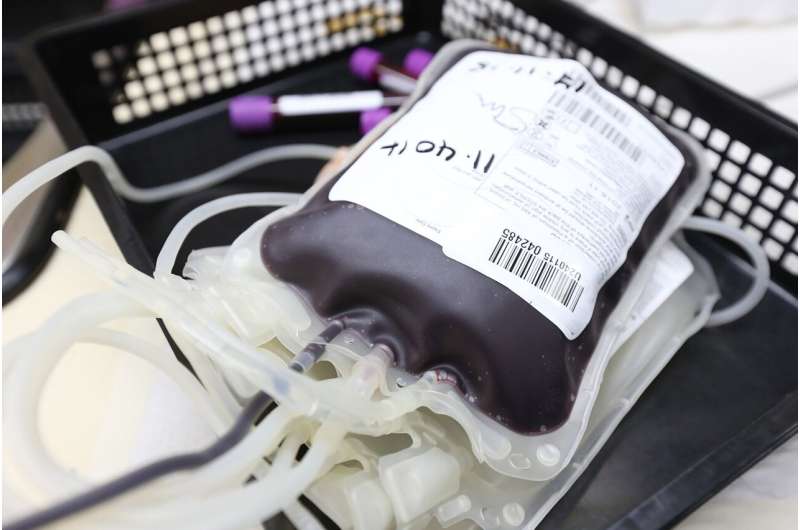
Credit score: Pixabay/CC0 Public Area
Giving extra blood to anemic sufferers after a coronary heart assault could save lives, in accordance with a Rutgers Well being–led research. The research, revealed in NEJM Proof, affirms analysis carried out in 2023 that prompt mortality charge or recurrent coronary heart assaults had been extra frequent in anemic sufferers who acquired much less blood.
Jeffrey L. Carson, provost and Distinguished Professor of medication at Rutgers Robert Wooden Johnson Medical Faculty, led each research. The 2023 trial—known as MINT (myocardium infarction and transfusion)—checked out transfusions in anemic sufferers following a coronary heart assault.
After that 2023 trial, Carson deliberate a research on blood transfusions that mixed knowledge from related trials to generate extra exact estimates of therapy results.
In cooperation with researchers in France and america, Carson acquired knowledge from the 4 scientific trials evaluating blood transfusion in 4,311 sufferers with coronary heart assaults. These trials included sufferers who had a coronary heart assault and low blood depend. Half the sufferers acquired fewer blood transfusions and the opposite half acquired extra blood transfusions. The trials in contrast the frequency of loss of life at 30 days or recurrent coronary heart assaults and loss of life at six months.
The outcomes of this evaluation did not definitively set up that giving fewer blood transfusions elevated a affected person’s danger of loss of life or coronary heart assault at 30 days, however did recommend that utilizing fewer transfusions was related to an elevated danger of loss of life at six months.
Within the unique scientific trial, a big proportion of sufferers had suffered a earlier coronary heart assault, coronary heart failure, diabetes or kidney illness. The typical age of individuals was 72, with 45% ladies.
The researchers in contrast the frequency of the primary consequence of loss of life or recurrent coronary heart assault at 30 days after enrollment into the trial. Though not statistically vital, the research discovered the frequency of mortality or recurrent coronary heart assault was 2.4% decrease when a liberal strategy was used.
“The results of this analysis show that giving more blood to anemic patients with heart attacks can save lives at six months,” Carson mentioned.
For almost twenty years, Carson has studied the implications of purple blood cell transfusion methods towards offering optimum therapy for sufferers. His work helped set up transfusion pointers in 2012 utilized by physicians to tell affected person care, updates to which had been introduced final yr within the Journal of the American Medical Affiliation emphasizing an individualized strategy in adults and youngsters that accounts for the sufferers’ underlying medical issues, affected person preferences and signs.
Extra data:
Jeffrey L. Carson et al, Restrictive versus Liberal Transfusion in Myocardial Infarction — A Affected person-Stage Meta-Evaluation, NEJM Proof (2024). DOI: 10.1056/EVIDoa2400223
Supplied by
Rutgers College
Quotation:
Extra blood transfusions linked to decrease 6-month mortality in heart-attack sufferers with anemia (2024, December 23)
retrieved 23 December 2024
from https://medicalxpress.com/information/2024-12-blood-transfusions-linked-month-mortality.html
This doc is topic to copyright. Aside from any truthful dealing for the aim of personal research or analysis, no
half could also be reproduced with out the written permission. The content material is offered for data functions solely.




